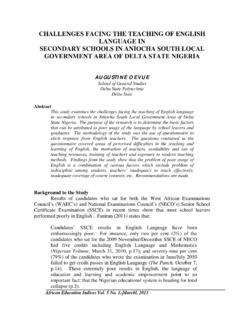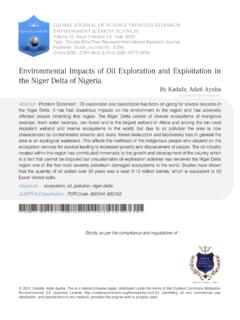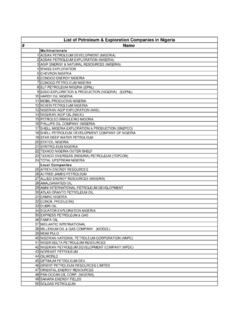Transcription of THE EFFECTS OF OIL POLLUTION ON THE ENVIRONMENT
1 1 THE EFFECTS OF OIL POLLUTION ON THE ENVIRONMENT Godwin Onajite Eshagberi Abstract Crude oil provides the energy that drives the economy of most countries of the world today. Since crude oil was first discovered in Nigeria in 1958, oil exploration has continued in the Niger-Delta. This paper examined the EFFECTS of oil POLLUTION on the ENVIRONMENT . Oil POLLUTION occurs when crude oil and its refined products are spilled into the ENVIRONMENT by the activities of man. The consequences of oil spills are more severe in aquatic ecosystem. They interfere with functioning of various organ systems of plants and animals. Apart from its effect on biodiversity of the imparted habitats, neighbouring communities are also denied of their sources of livelihood. Regular maintenance, provision of security at oil facilities and early response to oil spillages may reduce the incidences and effect of oil POLLUTION .
2 The development of the world today is closely associated with and is driven by the discovering of crude oil which provides the basic energy needed in manufacturing, transport, agriculture and other sectors of the economy. Oil as a source of energy was first discovered in commercial quantity in Oloibiri in Rivers State, Nigeria in 1958 by Shell. Since then oil exploitation has continued in Nigeria especially in the Niger Delta. The discovery and exportation of oil led to the oil boom period of the 1970s with oil contributing about 90% of export earning and 80% of the nation s Gross Domestic Product (GDP). (Adeyanju, 2004; Egberongbe, Nwilo and Badejo, 2006; Ibemesim, 2010). Oil POLLUTION Oil exploration, exploitation and use have several consequences for the ENVIRONMENT . Oil POLLUTION is one of the major problems faced by coastal ecosystems.
3 Oil POLLUTION can be described as the introduction by man directly or indirectly any hydrocarbon materials especially crude oil and its refined products into the ENVIRONMENT . (Adeyanju, 2004). The nigerian physical ENVIRONMENT has been negatively impacted by the activities of oil companies. Oil POLLUTION which arises mainly from oil spills has serious implication for biodiversity as most biotic habitats are either destroyed or altered making them unsuitable for habitation. Oil spillage is categorized into four groups, minor, medium, major and disaster. A minor spill takes place when the oil discharge is less than 25 barrels in inland waters or less than 250 barrels on land, offshore or coastal waters that does not pose a threat to the public health or welfare. Medium spill is 250 barrels or less in the inland water or 250 to 2500 barrels on land, offshore and coastal water while the major spill is in excess of 2500 barrels on land, offshore or coastal waters.
4 Disaster refers to any uncontrolled well blowout, pipeline rupture or storage tank failure which poses an imminent threat to the public health or welfare (Egberongbe Nwilo and Badejo, 2006). The most serious oil spillage affects marine and coastal areas including the creeks and water distributaries. The overall EFFECTS of oil on ecosystem health and biota are numerous. Oil interferes with the functioning of various organs and systems of plants and animals. It creates environmental conditions unfavourable for life. For example, oil in the water surface forms a layer which prevents oxygen from dissolving in water. Crude oil also contains toxic components which cause outright mortality of plants and animals as well as other sub lethal impacts (Zabbey, 2004; Agbogidi, Eruotor, and Akparobi, 2007; Bamidele, Agbogidi, 2007; Osuji, Erondu and Oguli, 2010).
5 The nigerian Academic Forum Volume 23 No. 1, November, 2012 2 Sources of Oil POLLUTION The major sources of oil POLLUTION include drilling accidents, transportation accidents affecting tankers, leakages from refineries and storage tanks and leakages from pipelines. Between 1976 and 1997 there have been spillages releasing about barrels of oil into the land, swamp, estuaries and coastal waters of Nigeria (Dublin-Green, Nwankwo and Irechukwu, 1998; Nwilo and Badejo, 2005). Majority of oil spills occurring in the Niger Delta are considered minor and are not reported. Some of the pronounced oil spillages recorded in the petroleum industry of the Niger Delta include Bomu-II blow out, 1970; Forcados terminal spillage, 1980; Funiwa-5 oil well blow out, 1988; Oyakana pipeline spillage, 1980; Okana pipeline spillage, 1985; Oshika pipeline spill, 1993 and the Goi Trans Niger pipeline oil spill, 2004 (Zabbey, 2004).
6 The table below shows some oil POLLUTION incidences in Nigeria. Table 1: Oil POLLUTION Incidences in Nigeria Year Location Qty spilled bbl Cause of spill Effect 1979 Forcados terminal 570,000 Accidental rupture of the bottom plate of storage tanks Fishing activities inhibited, mangrove destroyed 1980 Funiwa oil well blow out 421,000 Oil well blow out Death of fishes, crabs etc. Socio economic activities affected. 1980 Oyakama 30,000 Over 25 hectares of land polluted. 1981 Abudu pipeline 5240 Pay loader destroyed pipeline Damage to agric products, water, soil and marine line. 1983 Oshika 10,000 Pipeline rupture Fishes killed, water contaminated. 1986 Funiwa oil blowout 200,000 Oil well blow out About 350 hectares of mangrove polluted, fish killed. 1994 Agoda/Brass oil pipeline Pipeline corrosion Over 10sq km of farmland polluted, ponds, lakes and stream contaminated.
7 1998 Idoho (Mobil) 401,000 Offshore discharge Over 10sq km of farmland polluted, ponds, lakes and stream contaminated. 2003 Kwale oil well explosion Lack of maintenance of facilities suspected. Farmland polluted. 2003 Kalabilema oil spill explosion Oil spill and explosion followed causes not yet ascertained. 5 lives lost Source: Adeyanju, 2004. Causes of Oil POLLUTION The causes of oil POLLUTION in Nigeria have been identified by several studies (Adeyanju, 1999; Zabbey, 2004; Nwilo and Badejo, 2005; Egberongbe, Nwilo and Badejo, 2006). These causes have been classified into i. Use of outdated and ineffective technology Godwin Onajite Eshagberi 3 ii. Refilling of abatement technology and upgrading of old plants. iii. Social political causes sabotage, vandalism etc. iv. Civil crises such armed struggle / terrorism. v. Accidents such as equipment failure, corrosion and rupture of oil pipes, blow out etc.
8 Vi. Natural disasters such as earthquakes, hurricanes and tornadoes may cause oil to spill. According to these studies about 57% of oil POLLUTION in Nigeria are caused by sabotage or vandalism. Petroleum Based Oil (i) Crude oil Crude oil is a naturally occurring, flammable liquid consisting of a complex mixture of hydrocarbons of various molecular weights and other liquid organic compounds that occur in geologic formation beneath the earth s surface. The hydrocarbons in crude oil are mostly alkanes, cycloalkanes and various aromatic hydrocarbons while the other organic compounds contain nitrogen, oxygen, sulfur and trace amount of metals such as iron, nickel, copper and vanadium. Four different types of hydrocarbons molecules are found in crude oil. They include paraffin, naphthenes, aromatics and asphaltics.
9 There relative percentage varies from one oil type to the other. Crude oil varies in appearance depending on its composition. It is usually black or dark brown although some may be yellowish, reddish or greenish. Eighty four percent by volume of the hydrocarbons present in petroleum is converted to energy rich fuels such as gasoline, diesel, jet, heat and other fuel oils. (Glasby 2006; Kvenvolden, 2006). (ii) Diesel fuel Diesel fuel in general is any liquid used in diesel engines. Diesel fuel obtain from petroleum is called petrodiesel and is produced from the fractional distillation of crude oil between 2000C and 3500C at atmospheric pressure resulting in a mixture of carbon chains that typically contain between 8 and 21 carbon atoms per molecule (Collins 2007, Ayhan 2008). Petroleum derived diesel is composed of about 75% saturated hydrocarbons mainly paraffin and cycoparaffin and 25% aromatic hydrocarbon such as naphthalenes and alkyl benzene.
10 The average chemical formula for common diesel fuel is from C10H20 to C15H28. Diesel is much denser than gasoline and provides more energy per unit volume than gasoline. It has moderate solubility and volatility. The short term hazards of the lighter more volatile compounds such as toluene, ethyl benzene and xylenes in diesel include toxicity to aquatic life especially in confined areas. Long term EFFECTS of these compounds include contamination of ground water. Diesel spills could result in potential acute toxicity to some forms of aquatic life (Hincks, 2004). (iii) Gasoline Gasoline also called petrol consists mostly of aliphatic hydrocarbons obtained by the fractional distillation of petroleum. The gasoline produced directly from crude oil does not meet the specifications for modern engine therefore it is enhanced with ISO-octane or the aromatic hydrocarbons toluene and benzene to increase its octane rating.











